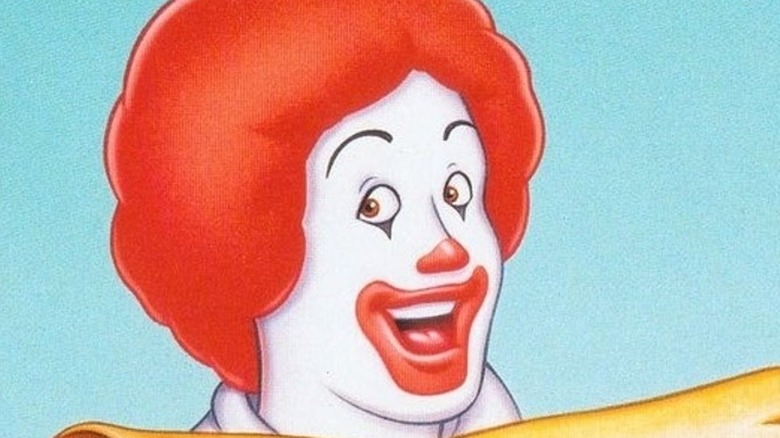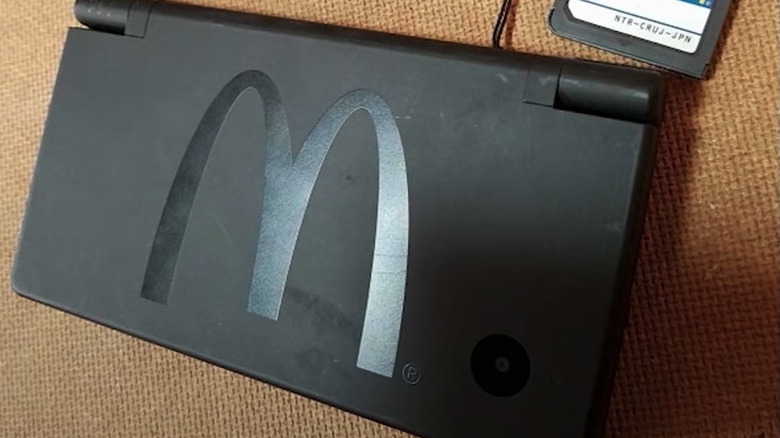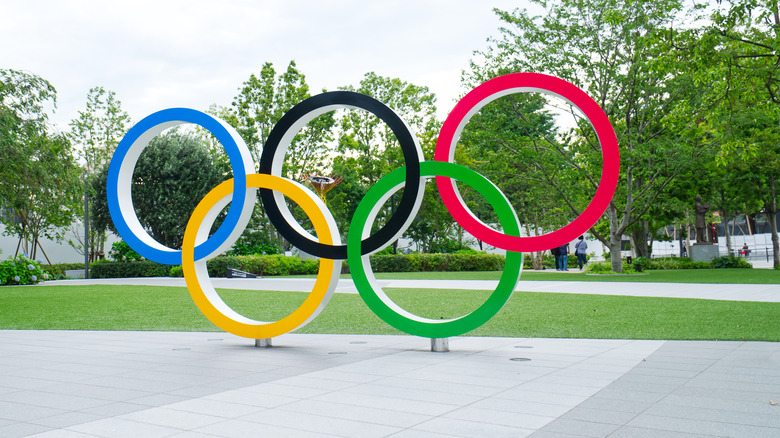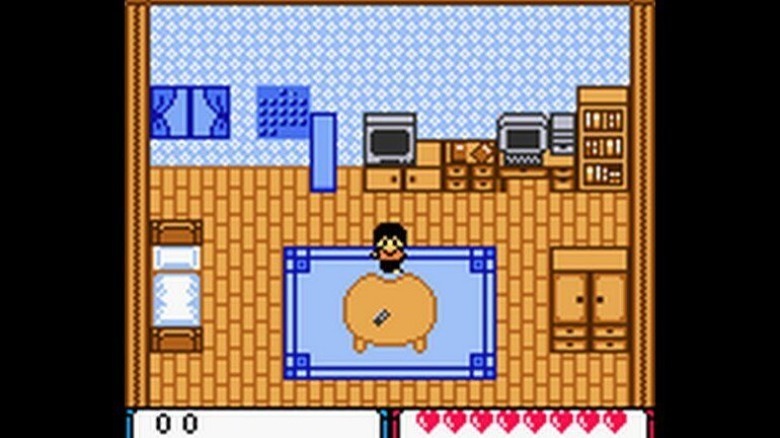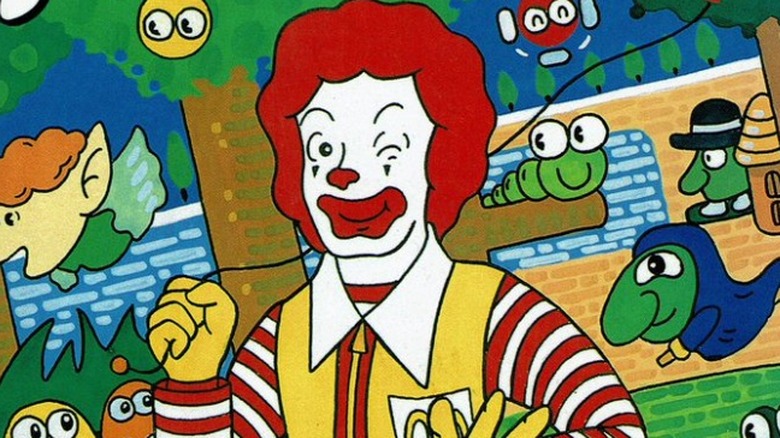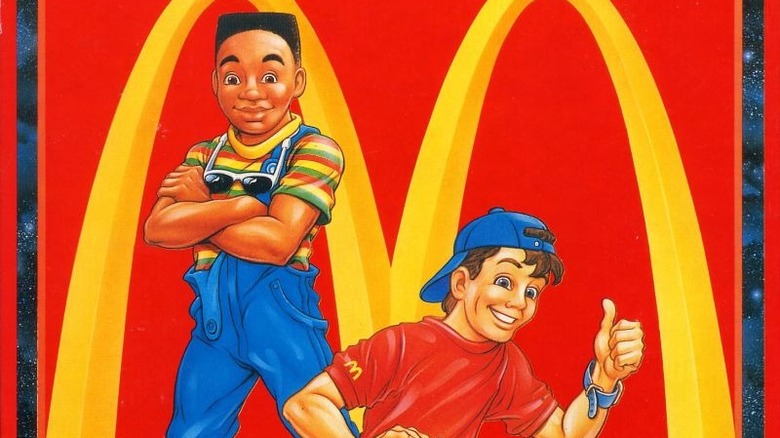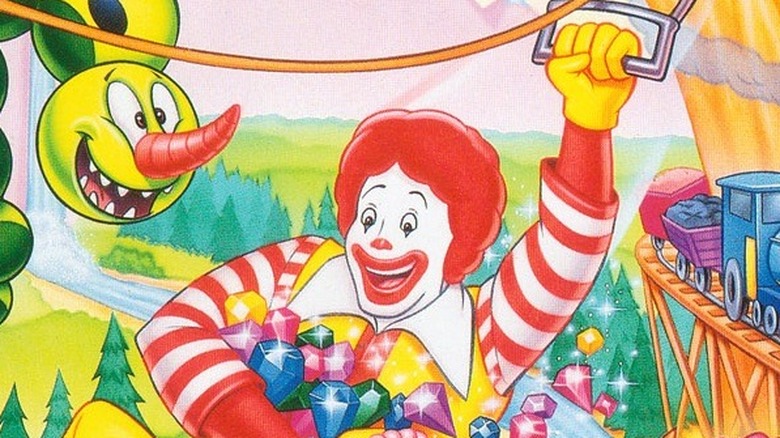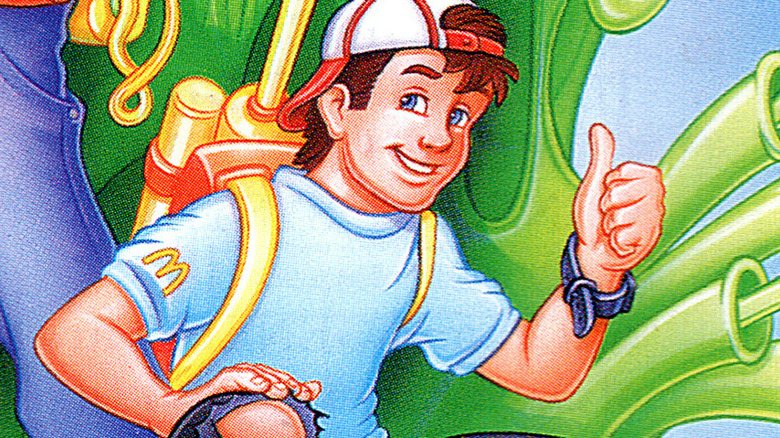Every McDonald's Video Game Ranked Worst To Best
Ah, McDonald's. Nothing quite compares to the taste of an inexpensive cheeseburger or a hot carton of salty fries. There's no denying that the American fast food chain has become one of the most recognizable companies in the world. Over the years, McDonald's has marketed its products in a variety of ways, including partnering with "Pokemon" for a series of collectible cards. However, Happy Meal toys aren't the only way the chain has teamed up with the video game world. McDonald's has also produced several little-known video games that attempted to simultaneously advertise and provide a fun experience for players of all ages.
Maybe none of these games will change your life as much as the right McDonald's breakfast hack, but they do offer up an interesting look at how McDonald's uses its marketing powers to reach out in a multitude of ways. Some of McDonald's marketing decisions have been pretty bad (particularly when it comes to using Twitter), but video games are an entirely different beast.
Many games go on to have successful sales without the added benefit of good reviews or huge ad campaigns. Unfortunately, even with the power of Ronald McDonald behind them, most of the following games failed to impress critics and gamers.
7. eCrew Development Program
To be fair, "eCrew Development Program" isn't technically a game at all, but a training program created for the Nintendo's best-selling console, the DS. In an attempt to make training more exciting, McDonald's took a chance on developing its own instructional game, which taught players how to cook meals and interact with customers. Trainees played the game on McDonald's own branded Nintendo DSi, which was specifically used for "eCrew Development Program." Players had to enter a special serial code and store number in order to fully access the game, meaning that collectors who get their hands on the game today might have trouble logging in and seeing what all the fuss is about.
This training game is so rare that some people didn't believe "eCrew Development Program" existed at all, much less the McDonald's-branded DSi. According to YouTuber Nick Robinson, many gamers have argued that the game was a complete hoax. However, in 2020, Robinson tracked down a copy of "eCrew Development Program" and played it for his viewers.
The game, which is entirely in Japanese, includes quizzes about McDonald's procedure and interactive mini games about food preparation. While it seems cooler than, say, sitting through boring training seminars, it's clearly not as fun as some of the other games McDonald's has made.
6. The Lost Ring
The Olympics tend to raise questions about what athletes eat or which of brands they endorse, but McDonald's has also generated controversy in that arena. In 2008, McDonald's attempted to relaunch its controversial McAfrika burger as a limited time Olympics treat, and it didn't go over well. While people were upset about the McAfrika, the fast food chain saw some success with another 2008 Olympics-themed endeavor. McDonald's secretly funded and created "The Lost Ring," an obscure online alternate reality game that tied into the Beijing Olympics.
"The Lost Ring" set players out on a real world adventure in order to find a lost Olympic ring, but the most mysterious part of the game had nothing to do with its plot. Despite funding the endeavor, McDonald's initially kept its involvement with the game a secret.
In an interview with The New York Times, Mary Dillon, McDonald's global chief marketing officer at the time, said, "The Olympics in Beijing are a very big event for us, and we have a lot of different types of activation, with 'The Lost Ring' being the most creative." Dillon also explained, "Our goal is really about strengthening our bond with the global youth culture."
The youth culture responded, in a way. According to Wired, players were more than happy to work together to solve the ARG and piece together its relationship to McDonald's.
5. McDonald's Monogatari: Honobono Tenchou Ikusei Game
Of McDonald's more mainstream video game offerings, "McDonald's Monogatari: Honobono Tenchou Ikusei Game" is probably the worst. One player referred to the title — which translates to "McDonald's Story: Friendly Manager Training" — as "an advertisement masquerading as a game."
"McDonald's Monogatari" seemingly attempts to take cues from slice of life games like "Harvest Moon" or its spinoffs, making relationships and happiness a priority for the player character, who really just wants to be a manager at their local McDonald's. However, something in the formula seems a bit off, and the result is a game that feels monotonous.
One player wrote a detailed review of "McDonald's Monogatari," and ultimately deemed it the worst McDonald's themed game they'd ever played — and they'd played several. Another player mentioned that "McDonald's Monogatari" didn't even seem to have a solid ending. Despite maxing out relationships and earning money for the company, the game's ending did not recognize any achievements or indicate success or failure. Video games have seen some insulting endings over the years, but nothing feels worse than finishing a game and finding out that none of the characters' choices mattered.
4. Donald Land
"Donald Land" was released in 1987 for the Nintendo Famicom, and although it didn't make any waves at the time, it has achieved cult status over the years. Obscure video game reviewer VGJunk explained that "Donald Land" apparently earned its awkward name because of a different in how the title character is presented in other parts of the world. See, in Japan, Ronald McDonald goes by "Donald McDonald."
VGJunk ultimately said that "Donald Land" was "not as good as the very best of the genre, your 'Mario Bros.' and such, but it's well above average for a licensed Famicom platformer." In the world of McDonald's video games, "above average" seems to work just fine.
The slippery physics engine present in "Donald Land" has frustrated more than a few players in its time, but some gamers have appreciated it for its charm. One reviewer explained that "Donald Land" acted as a window into the wider world of Japanese-exclusive games. "Donald Land" was weird, but it also felt familiar to many players, thanks to its bright mascot and burger-themed weapons. Plus, players could shoot projectiles and ride on them after they were fired, and there's no way to describe that except cool.
3. M.C. Kids
Many gamers actually enjoy "M.C. Kids," the 1992 NES romp featuring two young boys given the uncreative names Mick and Mack. Of course, the Hamburgler acted as the villain of the game, constantly one step ahead of Mick and Mack as they attempted to save the world and the McDonald's corporation.
Surprisingly, GamePro Magazine gave "M.C. Kids" a favorable review, calling it "just right for its target audience." GamePro did note that experienced players might find "M.C. Kids" too simple to be enjoyable, but the game wasn't bad per se.
However, according to Boxed Pixels, McDonald's itself disliked "M.C. Kids." Dave Perry, who designed "McDonald's Global Gladiators," elaborated, "I remember McDonalds absolutely hated ['M.C. Kids'] ... 'Where's Ronald McDonald?' they asked. 'Why can't the player go into McDonald's and buy a burger with fries?'"
It's usually bad news when a developer bashes their own games. As a compromise, the game's developers added in a smiling Ronald McDonald to congratulate players at the end of each stage. McDonald's was reportedly still dissatisfied with the game's end result, and with game critics dubbing "M.C. Kids" as too easy for dedicated players, the game really didn't stand a chance against the competition.
2. McDonald's Treasure Land Adventure
"McDonald's Treasure Land Adventure," which appeared on the Sega Genesis in 1993, served two purposes. The first purpose — to sell fast food — felt obvious, but the second purpose had more nuance. "McDonald's Treasure Land Adventure" serves as a hint at the brilliance of Treasure, the beloved developers of "Gunstar Heroes," which also released in 1993. Though Treasure's full capabilities weren't quite realized in this McDonald's-branded adventure, traces remain of what the company would eventually accomplish with games like the little-known "Alien Soldier" for the Sega Genesis.
"McDonald's Treasure Land Adventure" sticks out from other McDonald's branded games because it features a strange health system based on red jewels. If Ronald McDonald runs out of red jewels, he'll die, but he also must sacrifice jewels in order to save friends and defeat bosses. Hardcore Gaming 101 commented on the strange conundrum, calling it "demented." Asking gamers (and especially child players) to kill the cheery McDonald's mascot in order to save others seemed like an odd bit of sacrificial theatre. Still, "McDonald's Treasure Land Adventure" further demonstrated that even the most innocuous of fast food-themed games could get weird.
While another reviewer gave the game a mediocre 5/10 for its shoddy combat system, "McDonald's Treasure Land Adventure" knew how to party. And as Kotaku pointed out, the soundtrack absolutely slapped, and still sounds great today.
1. McDonald's Global Gladiators
By far, the best game out of the McDonald's branded bunch is none other than "McDonald's Global Gladiators," which appeared in 1992 for the Sega Genesis. Video Games and Computer Entertainment magazine gave "Global Gladiators" a perfect score because of its lush visuals and engaging gameplay. Sega Force Magazine, the official outlet back in the day for all things Sega, also gave "Global Gladiators" a good review, though it noted that the game might be too easy for some players.
Not everyone enjoyed "Global Gladiators," though, which featured the much-despised Mick and Mack from "M.C. Kids." A separate review said that the game was "gritty" and full of graphical errors, dubbing "M.C. Kids" the clearly superior game. However, the game also seemed to have a great soundtrack, which made up for some sins.
McDonald's is, above all else, a fast food company. Its forays into the gaming world have been few and sadly, not that impactful, but that doesn't mean that many gamers don't have fond memories of guiding Ronald McDonald through magical worlds, or helping Mick and Mack battle evil. In fact, while Burger King has sold Nintendo toys and Arby's has produced bizarre DLC for "Shovel Knight," McDonald's appears to be one of the few fast food companies to successfully embrace gaming as a marketing tool.
